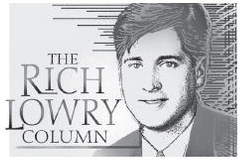In defense of Reagan


Presumably, Donald Trump will never produce the dark secrets promised about Ron DeSantis’ past. But his team thinks it already has one — the Florida governor once was a Reagan Republican.
“There’s a pre-Trump Ron and there’s a post-Trump Ron,” someone in the Trump camp told Axios. “He used to be a Reagan Republican. That’s where he comes from. He’s now awkwardly trying to square his views up with the populist nationalist feeling of that party.”
In his CPAC speech doubling down on “MAGA,” Trump said, “We are never going back to the party of Paul Ryan, Karl Rove and Jeb Bush.” He didn’t mention Reagan, but the inclusion of the Gipper in the hall of shame was heavily implied.
This way of thinking in a Republican primary is something new. Once, pretty much every Republican wanted to be a Reagan Republican. If the Trump camp gets its way, Reaganism will have gone from passé in 2016 to an affirmative vulnerability in 2024.
There are layers to this intra- Republican debate. It is certainly true that conservatives became overly obsessed with identifying themselves with Ronald Reagan and when something becomes an -ism, it is likely to be simplified and ossified.
Then, there’s the sheer passage of time. Reagan left office 34 years ago. As of 2020, more than half of Americans were under age 40, meaning they have no real memory of Reagan.
Neither the pro- nor anti-Reagan side tends to do justice to the real, historical political figure.
Reagan was a free marketeer but wasn’t doctrinaire. He accepted the fact of the New Deal. He was a free trader, yet acted to protect American automakers and Harley-Davidson from Japanese imports.
If he was hawkish on foreign policy, he was always prudent. He was cautious about deploying U.S. troops overseas and contemplated eliminating nuclear weapons at a summit with Mikhail Gorbachev in Reykjavik.
Although Reagan eventually came to define conventional Republicanism, he took on his party’s liberal establishment and brought a populist voice to issues like the Panama Canal and crime.
At the end of the day, Reagan’s achievements are momentous and should be acknowledged as such by all Republican factions. He set the predicate for winning the Cold War. He slayed inflation. He ended the energy crisis. He forced a turn to the center by the Democratic Party under Bill Clinton. He changed the mood of the country.
The thoughtless version of Reaganism doesn’t take sufficient account of how circumstances in the country have changed in the last 30 years. Take taxes. The burden of federal income taxes isn’t nearly as heavy on middle-class families as it was in the 1970s and 1980s, when inflation pushed them into ever-higher tax brackets. And Republicans have cut taxes so many times, any positive economic effect of further reductions is limited. TITLE: Nonetheless, for the longest time, the standard Republican approach to domestic policy, with some differences in emphasis, was to cut taxes and reduce the debt, with everything else fading to the background. As it happens, Trump also ran on these two priorities in 2016, but also plowed new ground — as other Republicans should — on a host of issues.
The example of Reagan, like that of all accomplished statesmen, offers broad lessons continued from page
that can be continually drawn on — about how to balance prudence and principle, how to affect a large-scale political vision, how to deplore what ails the country without giving in to despair, and how to build coalitions.
The last may be most useful to DeSantis once he enters the nomination battle. To win, he is going to need to get a segment of Trump populists at the same time he locks down Republican voters who like Reagan more than Trump.
The Trump forces are going to try to make De-Santis’ roots in the party of Reagan disqualifying. Instead, played correctly, it can be a strength.
Rich Lowry is editor of the National Review.
Synd., Inc.






out of
Posted on